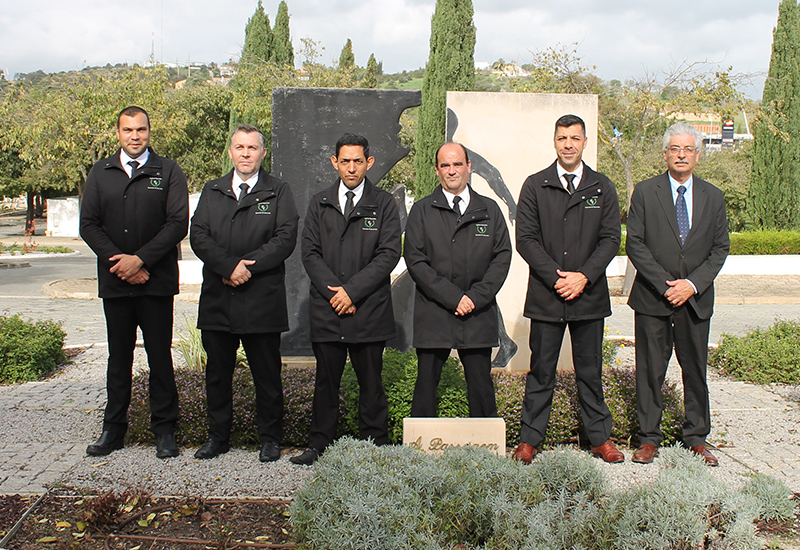Nelson plays an unusual but essential role in the community of Lagos and the surrounding area. Guerreiro e Guerreiro was established almost 40 years ago by Nelson’s father-in-law, José Guerreiro.
Just over a year ago, a close friend of mine died. Not knowing what to do, I contacted Tanja from the Madrugada palliative care team who advised me to contact a funeral home immediately. As Guerreiro e Guerreiro was advertising in Tomorrow magazine, I phoned their office in Lagos. I had always found their team friendly when delivering the magazines to them over the years.
Nelson Lopes, head of services, arrived shortly after the phone call at my friend’s home in Aljezur. At a time when I was in shock and stricken with grief, he provided the perfect balance of empathy and professionalism.
“I was born in Évora in 1982 and studied there until I was 21,” he recounts. “I then joined the Escola de Tropas Aerotransportadas, where I became a paratrooper. In 2005, my work brought me to Lagos and here, in 2009, I met my wife, Alexandra.”
Nelson helped out at the funeral home in his spare time for nine years. “I learnt the tricks of the trade from my father-in-law, who was the very best teacher. In 2016, I married Alexandra, leaving military service to work full-time at the funeral home,” he recounts.
The law in Portugal states that a person must be buried or cremated within 48 hours of death, so quick decisions need to be made. Relatives of the deceased are often still reeling and in heightened states of distress, so making big decisions within this short but crucial time frame can be difficult. Nelson is very sensitive to this and he guides them expertly through the entire process. The authorities will extend the 48-hour time limit in cases where an autopsy, repatriation or investigation is required.
My friend died in hospital, so firstly, Nelson needed to see the testament to identify the executor. Hospitals will only release the body to the funeral home when provided with photos of the testament and the personal identification documents of the principal heir. Nelson stresses the importance of having a will and the family’s knowledge of its whereabouts. “If someone dies without a testament, the law states that the spouse (or partner) is responsible for signing documents, and if there is no spouse, it will be the next of kin. The process is more efficient if there is a will in place,” he emphasises.

When a person dies at home, a doctor is needed to provide a medical certificate, and Nelson will organise the other necessary paperwork for the funeral. If an autopsy is requested, he will arrange for the deceased to be taken to the unit at Portimão hospital. The local court will then dispense an order for an examination. The bereaved do not have to arrange anything.
“Each hospital has its own procedure on the rare occasion where there is no family and no testament. In cases of poverty, there are death benefits from a social fund to support the families with the funeral costs,” he says.
Nelson will advise families as to whether to bury or cremate the deceased. The decision was straightforward for me as my friend had already specified that she wanted to be cremated. “Now there is a crematorium in the Algarve, more people are choosing this method. Family and friends can attend the cremation at the appointed time, but sometimes people prefer not to. The urn containing the ashes will be brought to you by us a few days later, and the law in Portugal permits you to do what you wish with them,” Nelson explains.
“In my opinion, burial in a cemetery has more associated expenses than a cremation. In Lagos and most municipalities in Portugal, the cemeteries are overcrowded, so when you choose to bury someone, you can only lease a temporary plot. After three years, you may cremate the bones or place them in the cemetery ossuary, which in Lagos is in the cemetery wall. You are not allowed to bury a body anywhere except in a cemetery.” Until recently, the Portuguese custom was to have open caskets. However, during the pandemic, this practice was prohibited. Since then, most Portuguese people have opted for closed coffins.
“For the grieving process and acceptance of the death of a loved one, I feel that an open coffin is a better way,” Nelson expresses. He and his team always beautify the bodies and dress them as the family chooses. This way, if someone does want to see the body, it is presentable!

For foreigners, there is the option to repatriate the body. To transport corpses, a method called thanatopraxia is used, which involves replacing the blood with a hygienic preserving solution. The body is laid in a wooden casket with a watertight inner coffin made of zinc, and a purifying device is installed to equalise the internal and external pressure. Dead people can be transported anywhere in the world by employing this technique.
Donating your body to medical science is a great and widely accessible alternative. By simply googling ‘Body Donation to Science’ and following the English instructions, you’ll find the required Body Declaration Form. Once printed and filled in, send it to the address supplied, inform your family, and include your wish in your will. The donation office must be notified at the time of death. Anybody who dies in intensive care is automatically a potential organ or tissue donor unless, in life, they have registered in the National Register of Non-Donors. If you do this, you will be issued a non-donor card that you should carry with you.
“We deal with the funeral processes of numerous nationalities, religious beliefs and cultures and are able to provide lawyers and a British celebrant. Also, we can arrange catering for the funeral and transport for the family,” Nelson points out.
“Facing death daily, I am not immune to the immense sadness of losing loved ones; sometimes, my work is heartbreaking,” Nelson adds. “Death often disrupts my weekends, evenings and holidays, but nevertheless, I find my work rewarding. My long-term plan is to stay in the family business and spend as much time as possible with my wife and three-year-old twins!”
When my friend died, I felt paralysed – both by my emotions and by the daunting prospect of the bureaucratic process ahead. Calm and compassionate, Nelson was a godsend. He helped me immensely, and I will forever remain grateful to him.
+351 918 389 436













